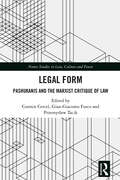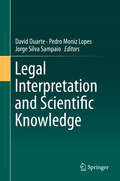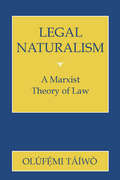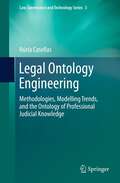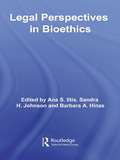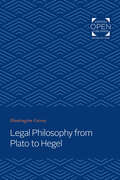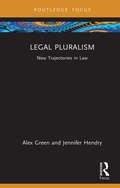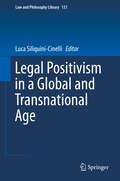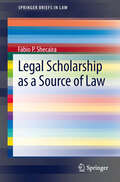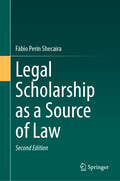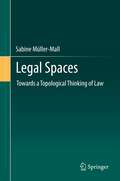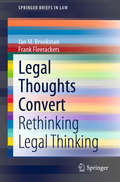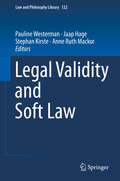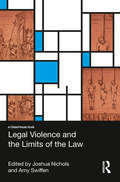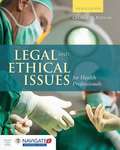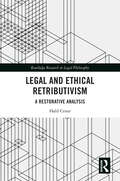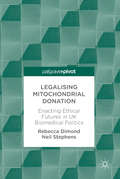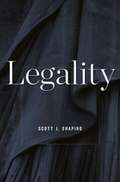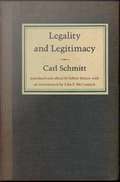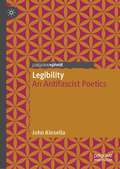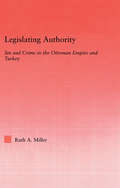- Table View
- List View
Legal Form: Pashukanis and the Marxist Critique of Law (Nomos Studies in Law, Culture and Power)
by Cosmin Cercel Przemysław Tacik Gian-Giacomo FuscoA century after the publication of Evgeny Pashukanis’ pivotal book General Theory of Law and Marxism, this collection presents a comprehensive account and analysis of his key concept of legal form.Evgeny Pashukanis’ General Theory, born amidst the fervour of the first socialist revolution, remains still a crucial reference point in Marxist theories of the law and critical legal theory. Its theoretical depth paved the way for new understandings of the relationship between Marxism and the law. Its crucial virtue continues to be, even after a century, the ability to articulate epochal concerns in the context of a socialist revolution that turned hitherto theoretical problems into dilemmas of practice. This book returns to Pashukanis’ main concept: ‘legal form’. Through this jurisprudential category Pashukanis aimed to grasp the dependence of the law on the economy, and at the same time, to enquire into the degree to which the law preserves its autonomy from economic relations. In other words, the legal form as a concept conveys both the law’s dependence on the economic sphere of exchange and its greatest inherent specificity: the way it translates economic relations into its proper language and set of legal/ideological constructs. The contributions to this volume provide a range of perspectives on how the concept of legal form has been developed and reinterpreted.Including the first English translation of Pashukanis’ essay, ‘Hegel, State and Law’, this collection will be of considerable interest to scholars and students of legal and political theory.
Legal Interpretation and Scientific Knowledge
by David Duarte Jorge Silva Sampaio Pedro Moniz LopesThis book discusses the question of whether legal interpretation is a scientific activity. The law’s dependency on language, at least for the usual communication purposes, not only makes legal interpretation the main task performed by those whose work involves the law, but also an unavoidable step in the process of resolving a legal case. This task of decoding the words and sentences used by normative authorities while enacting norms, carried out in compliance with the principles and rules of the natural language adopted, is prone to all of the difficulties stemming from the uncertainty intrinsic to all linguistic conventions. In this context, seeking to determine whether legal interpretation can be scientific or, in other words, can comply with the requirements for scientific knowledge, becomes a central question. In fact, the coherent application of the law depends on a knowledge regarding the meaning of normative sentences that can be classified (at least) as being structured, systematically organized and tendentially objective. Accordingly, this book focuses on analyzing precisely these problems; its respective contributions offer a range of revealing perspectives on both the problems and their ramifications.
Legal Naturalism: A Marxist Theory of Law
by Olufemi TaiwoLegal Naturalism advances a clear and convincing case that Marx's theory of law is a form of natural law jurisprudence. It explicates both Marx's writings and the idea of natural law, and makes a forceful contribution to current debates on the foundations of law. Olufemi Taiwo argues that embedded in the corpus of Marxist writing is a plausible, adequate, and coherent legal theory. He describes Marx's general concept of law, which he calls "legal naturalism." For Marxism, natural law isn't a permanent verity; it refers to the basic law of a given epoch or social formation which is an essential aspect of its mode of production. Capitalist law is thus natural law in a capitalist society and is politically and morally progressive relative to the laws of preceding social formations. Taiwo emphasizes that these formations are dialectical or dynamic, not merely static, so that the law which is naturally appropriate to a capitalist economy will embody tensions and contradictions that replicate the underlying conflicts of that economy. In addition, he discusses the enactment and reform of "positive law"--law established by government institutions--in a Marxian framework.
Legal Ontology Engineering
by Núria CasellasEnabling information interoperability, fostering legal knowledge usability and reuse, enhancing legal information search, in short, formalizing the complexity of legal knowledge to enhance legal knowledge management are challenging tasks, for which different solutions and lines of research have been proposed. During the last decade, research and applications based on the use of legal ontologies as a technique to represent legal knowledge has raised a very interesting debate about their capacity and limitations to represent conceptual structures in the legal domain. Making conceptual legal knowledge explicit would support the development of a web of legal knowledge, improve communication, create trust and enable and support open data, e-government and e-democracy activities. Moreover, this explicit knowledge is also relevant to the formalization of software agents and the shaping of virtual institutions and multi-agent systems or environments. This book explores the use of ontologism in legal knowledge representation for semantically-enhanced legal knowledge systems or web-based applications. In it, current methodologies, tools and languages used for ontology development are revised, and the book includes an exhaustive revision of existing ontologies in the legal domain. The development of the Ontology of Professional Judicial Knowledge (OPJK) is presented as a case study.
Legal Perspectives in Bioethics (Routledge Annals of Bioethics)
by Sandra H. Johnson Ana S. Iltis Barbara A. HinzeIssues in bioethics often turn, at least in part, on the law and regulatory requirements. Consisting of chapters that address particular bioethics topics from the law’s perspective, this fascinating book includes: an introduction to the American legal system papers identifying the principal ways in which the law influences discussions and decisions concerning each of the topics highlighted supplemental papers on certain areas that address the influence and status of the law in countries other than the United States. Covering traditional topics in bioethics, such as determinations of death and health care decisions for vulnerable groups, this study also explores emerging areas such as conflicts of interest in research, genetics, and privacy and confidentiality in the electronic age. Incisive and thought-provoking, this volume provides readers with a rich context for understanding the intersection between the law on bioethics and the central issues in bioethics.
Legal Philosophy from Plato to Hegel
by Huntington CairnsOriginally published in 1949. Huntington Cairns identifies the views that major Western philosophers took on law, the problems they considered significant about law, and the nature of the solutions they proposed. This book develops ideas discussed in Cairns' Law and the Social Sciences (1935) and Theory of Legal Science (1941). The object of these three volumes is the same: to construct the foundation of a theory of law that is the necessary antecedent to a possible jurisprudence. The inventory of philosophers that Cairns examines includes Plato, Aristotle, Cicero, Aquinas, Hobbes, Spinoza, and Hegel.
Legal Pluralism: New Trajectories in Law (ISSN)
by Jennifer Hendry Alex GreenThis book examines the development and fundamental nature of legal pluralism. Legal pluralism evokes two distinctions: ‘state’ vs ‘non-state’ law; and ‘law’ vs ‘non-law’. As such, although this book focuses upon circumstances in which two or more legal orders compete to govern the same social space, it also addresses the nature of law in general. Drawing on material conflicts arising within jurisdictions such as Australia, Burundi, Cameroon, Gambia, the United States, and Zambia, this book explores the conceptual, moral, and political challenges that legal pluralism creates. Emphasising that non-state law carries no less dignity than that often ascribed to the legal orders of contemporary states, it advances a theoretically sophisticated argument in favour of recognising and respecting genuine cases of legal pluralism, wherever they arise. Accessible and thought provoking, this book will appeal to legal scholars, anthropologists, sociologists, and political and social philosophers as well as practising lawyers, judges, and policymakers who deal with issues of legal pluralism.
Legal Positivism in a Global and Transnational Age (Law and Philosophy Library #131)
by Luca Siliquini-CinelliA theme of growing importance in both the law and philosophy and socio-legal literature is how regulatory dynamics can be identified (that is, conceptualised and operationalised) and normative expectations met in an age when transnational actors operate on a global plane and in increasingly fragmented and transformative contexts. A reconsideration of established theories and axiomatic findings on regulatory phenomena is an essential part of this discourse. There is indeed an urgent need for discontinuity regarding what we (think we) know about, among other things, law, legality, sovereignty and political legitimacy, power relations, institutional design and development, and pluralist dynamics of ordering under processes of globalisation and transnationalism.Making an important contribution to the scholarly debate on the subject, this volume features original and much-needed essays of theoretical and applied legal philosophy as well as socio-legal accounts that reflect on whether legal positivism has anything to offer to this intellectual enterprise. This is done by discussing whether global and transnational cultural, socio-political, economic, and juridical challenges as well as processes of diversification, fragmentation, and transformation (significantly, de-formalisation) reinforce or weaken legal positivists’ assumptions, claims, and methods. The themes covered include, but are not limited to, absolute and limited state sovereignty; the ‘new international legal positivism’; Hartian legal positivism and the ‘normative positivist’ account; the relationship between modern secularisation, social conventionalism, and meta-ontological issues of temporality in postnational jurisprudence; the social positivisation of human rights; the formation and content of jus cogens norms; feminist critique; the global and transnational migration of principles of justice and morality; the Vienna Convention on the Law of Treaties rule of interpretation; and the responsibility of transnational corporations.
Legal Rights and Moral Rights (Elements in Philosophy of Law)
by Matthew H. KramerIn a short span, this Element will delineate the general nature of legal and moral rights and the general nature of the holding of rights, and it will also sketch the justificatory foundations of rights. Hence, the Element will treat of some major topics within legal, political, and moral philosophy as it combines analytical theses and ethical theses in a complex pattern.
Legal Scholarship as a Source of Law
by Fábio P. ShecairaThis book is about the use of legal scholarship by judges. It discusses the possibility that legal scholarship may function as a genuine source of law in modern municipal legal systems. The book advances a number of claims, some conceptual, some empirical, some normative. The major conceptual claims are found in Chapters 2 and 3, where a general account of the notion of a source of law is provided. Roughly, sources of law are documents or practices (e.g. statutes, judicial decisions, official customs) from which norms can be derived that function as sources of content-independent reasons for judges to decide legal cases one way or another. The relevant notion of content-independence is derived (with qualifications) from H.L.A. Hart's jurisprudence. Indeed, the book's analysis of the concept of a source of law relies at various points on Hartian insights about law and legal reasoning. Chapter 4 argues that legal scholarship - or, more precisely, a particular type of legal scholarship that might be described as standard or doctrinal - can be, and indeed is, used as a source of law in modern legal systems. The conclusion that legal scholarship is used as a source of law (and thus as a source of content-independent reasons for action) may come as a surprise to those who associate judicial recourse to legal scholarship with judicial activism. This association is discussed and criticized in Chapters 5 and 6. It is argued that, in spite of a relatively common opinion to the contrary, legal scholarship can be used to mitigate discretion. In fact, it is precisely because it can be used in this way that judges sometimes refer to scholarship deceptively and suggest that it limits discretion in situations in which it really does not. The concluding chapter addresses potential objections not explicitly discussed in earlier chapters.
Legal Scholarship as a Source of Law
by Fábio Perin ShecairaThis book offers a philosophical analysis of the role played by legal scholarship in the written judicial decisions of different Western legal systems. Based on a positivist (and, more specifically, Hartian) theory of law, the book discusses the concept of a source of law and the possibility of including within that concept the writings of legal scholars. It also discusses the concept of authority and the structure of authority-based arguments, such as those that judges often employ when referring to legal scholarship in their judgments.
Legal Spaces
by Sabine Müller-MallThis book is concerned with a central question in contemporary legal theory: how to describe global law? In addressing this question, the book brings together two features that are different and yet connected to one another: the conceptual description of contemporary law on the one hand, and methods of taking concrete perspectives on law on the other hand. The book provides a useful concept for describing global law: thinking of law spatially. It illustrates that space is a concept with the capacity to capture the relationality, dynamics, and hybridity of law. Moreover, this book investigates the role of topological thinking in finding concrete perspectives on law. Legal Spaces offers an innovative and interdisciplinary approach to law.
Legal Thoughts Convert: Rethinking Legal Thinking (SpringerBriefs in Law)
by Jan M. Broekman Frank FleerackersThis book highlights how conversion via communication is one of the most important issues in legal thinking. A major aspect is its link with language – legal texts, judgments, opinions and legal concepts included. Further, conversion is connected to all social positions in law. But a jurist will not solely master specific social behaviors or become the manager of large-scale political fields of law as a legal scientist. A continuously changing integration opens up to his views on reality as it presents itself incessantly. Law and its functionaries are in a never-ending process of change in all domains of culture, which mark the 21st century. Conversions thus concern the riddle of wisdom and automatism, of individual privacy and social fixations, of philosophical considerations and converting flows.
Legal Validity and Soft Law (Law and Philosophy Library #122)
by Jaap Hage Pauline Westerman Stephan Kirste Anne Ruth MackorThis book features essays that investigate the nature of legal validity from the point of view of different traditions and disciplines. Validity is a fascinating and elusive characteristic of law that in itself deserves to be explored, but further investigation is made more acute and necessary by the production, nowadays, of soft law products of regulation, such as declarations, self-regulatory codes, and standardization norms. These types of rules may not exhibit the characteristics of formal law, and may lack full formal validity but yet may have a very real impact on people's lives. The essays focus on the structural properties of hard and soft legal phenomena and the basis of their validity. Some propose to redefine validity: to allow for multiple concepts instead of one and/or to allow for a gradual concept of validity. Others seek to analyze the new situation by linking it to familiar historical debates and well-established theories of law. In addition, coverage looks at the functions of validity itself. The discussion considers both international law as well as domestic law arrangements. What does it mean to say that something is valid? Should we discard validity as the determining aspect of law? If so, what does this mean for our concept of law? Should we differentiate between kinds of validity? Or, can we say that rules can be "more" or "less" valid? After reading this book, practitioners, scholars and students will have a nuanced understanding of these questions and more.Chapter 6 is available open access under a Creative Commons Attribution 4.0 International License via link.springer.com.
Legal Violence and the Limits of the Law: Cruel and Unusual
by Amy Swiffen Joshua NicholsWhat is the meaning of punishment today? Where is the limit that separates it from the cruel and unusual? In legal discourse, the distinction between punishment and vengeance—punishment being the measured use of legally sanctioned violence and vengeance being a use of violence that has no measure—is expressed by the idea of "cruel and unusual punishment." This phrase was originally contained in the English Bill of Rights (1689). But it (and versions of it) has since found its way into numerous constitutions and declarations, including Article 5 of the Universal Declaration of Human Rights, as well as the Amendment to the US Constitution. Clearly, in order for the use of violence to be legitimate, it must be subject to limitation. The difficulty is that the determination of this limit should be objective, but it is not, and its application in punitive practice is constituted by a host of extra-legal factors and social and political structures. It is this essential contestability of the limit which distinguishes punishment from violence that this book addresses. And, including contributions from a range of internationally renowned scholars, it offers a plurality of original and important responses to the contemporary question of the relationship between punishment and the limits of law.
Legal and Ethical Issues for Health Professionals
by George PozgarLegal and Ethical Issues for Health Professionals, Fourth Edition is a concise and practical guide to legal and ethical dilemmas facing healthcare professionals in the real-world today. Thoroughly updated and featuring new case studies, this dynamic text will help students to better understand the issues they will face on the job and the implications in the legal arena. With contemporary topics, real-world examples, and accessible language, this comprehensive text offers students an applied perspective and the opportunity to develop critical thinking skills. Legal and Ethical Issues for Health Professionals provides an effective transition from the classroom to the reality of a clinical environment.
Legal and Ethical Retributivism: A Restorative Analysis (Routledge Research in Legal Philosophy)
by Halil CesurThis book explores a foundational philosophical tension in contemporary retributivism, revealing ambiguities in its approach to punishment between two conflicting conceptions of restoration: legal justice and ethical love. Through an analysis of the three parties involved in a crime – the victim, the offender and the state – it argues that neo-retributivism has not sufficiently incorporated the ethical face of punishment into its theoretical framework. The pull of legal justice is often so strong that the voice of ethical love is silenced; neo-retributivism is at an impasse. To navigate this, the book engages with contemporary critical criminal justice scholarship, introducing the ideal of loving justice while highlighting an unresolved tension between penal reformism and abolitionism.The book will be of interest to academicians and researchers working in the areas of philosophy of punishment, criminal law theory, criminal justice, restorative justice, philosophy of law, political philosophy and Hegel scholarship.
Legalising Mitochondrial Donation: Enacting Ethical Futures In Uk Biomedical Politics
by Rebecca Dimond Neil StephensIn 2015 the UK became the first country in the world to legalise mitochondrial donation, a controversial germ line reproductive technology to prevent the transmission of mitochondrial disease. Dimond and Stephens track the intense period of scientific and ethical review, public consultation and parliamentary debates preceeding the decision. They draw on stakeholder accounts and public documents to explore how patients, professionals, institutions and publics mobilised within ‘for’ and ‘against’ clusters, engaging in extensive promissory, emotional, bureaucratic, ethical, embodied and clinical labour to justify competing visions of an ethical future. They describe how this decision is the latest iteration of a UK sociotechnical imaginary in which the further liberalization of human embryo research and use is rendered legitimate and ethical through modes of consultation and permissive but strictly regulated licensing. Overall, this book presents a timely, multi-dimensional, and sociological account of a globally significant landmark in the history of human genetics, and will be relevant to those with an interest in genetics, Science, Technology and Society, the sociology of medicine, reproductive technology, and public policy debate.
Legality
by Scott J. ShapiroWhat is law? In this book, Scott Shapiro draws on current work in the theory of action to offer an original and compelling answer to this perennial philosophical question.
Legality And Legitimacy
by Carl SchmittCarl Schmitt ranks among the most original and controversial political thinkers of the twentieth century. His incisive criticisms of Enlightenment political thought and liberal political practice remain as shocking and significant today as when they first appeared in Weimar Germany. Unavailable in English until now, Legality and Legitimacy was composed in 1932, in the midst of the crisis that would lead to the collapse of the Weimar Republic and only a matter of months before Schmitt's collaboration with the Nazis. In this important work, Schmitt questions the political viability of liberal constitutionalism, parliamentary government, and the rule of law. Liberal governments, he argues, cannot respond effectively to challenges by radical groups like the Nazis or Communists. Only a presidential regime subject to few, if any, practical limitations can ensure domestic security in a highly pluralistic society. Legality and Legitimacy is sure to provide a compelling reference point in contemporary debates over the challenges facing constitutional democracies today. In addition to Jeffrey Seitzer's translation of the 1932 text itself, this volume contains his translation of Schmitt's 1958 commentary on the work, extensive explanatory notes, and an appendix including selected articles of the Weimar constitution. John P. McCormick's introduction places Legality and Legitimacy in its historical context, clarifies some of the intricacies of the argument, and ultimately contests Schmitt's claims regarding the inherent weakness of parliamentarism, constitutionalism, and the rule of law.
Legends in Gandhian Social Activism: Addressing Environmental Issues By Dissolving Gender And Colonial Barriers (Ecology and Ethics)
by Bidisha MallikThis book is about Madeleine Slade (1892-1982) and Catherine Mary Heilemann (1901-1982), two English associates of Mohandas K. (Mahatma) Gandhi (1869-1948), known in India as Mira Behn and Sarala Behn. The odysseys of these women present a counternarrative to the forces of imperialism, colonialism, capitalism, and globalized development. The book examines their extraordinary journey to India to work with Gandhi and their roles in India’s independence movement, their spiritual strivings, their independent work in the Himalayas, and most importantly, their contribution to the evolution of Gandhian philosophy of socio-economic reconstruction and environmental conservation in the present Indian state of Uttarakhand. The author shows that these women developed ideas and practices that drew from an extensive intellectual terrain that cannot be limited to Gandhi’s work. She delineates directions in which Gandhian thought and experiments in rural development work and visions of a new society evolved through the lives, activism, and written contributions of these two women. Their thought and practice generated a new cultural consciousness on sustainability that had a key influence in environmental debates in India and beyond and were responsible for two of the most important environmental movements of India and the world: the Chipko Movement or the movement against commercial green felling of trees by hugging them, and the protest against the Tehri high dam on the Bhagirathi River. To this day, their teachings and philosophies constitute a useful and significant contribution to the search for and implementation of global ideas of ecological conservation and human development.
Legibility: An Antifascist Poetics (Modern and Contemporary Poetry and Poetics)
by John KinsellaThis Pivot book provides a wide-ranging and diverse commentary on issues of legibility (and illegibility) around poetry, antifascist pacifist activism, environmentalism and the language of protest. A timely meditation from poet John Kinsella, the book focuses on participation in protest, demonstration and intervention on behalf of human rights activism, and writing and acting peacefully but persistently against tyranny. The book also examines how we make records and what we do with them, how we might use poetry to act or enact and/or to discuss such necessities and events. A book about community, human and animal rights and the way poetry can be used as a peaceful and decisive means of intervention in moment of public social and environmental crisis. Ultimately, it is a poetics against fascism with a focus on the well-being of the biosphere and all it contains.
Legislating Authority: Sin and Crime in the Ottoman Empire and Turkey
by Ruth MillerLegislation Authority addresses issues of law, state violence, and state authority within the Ottoman and Turkish context.
Legislative Effectiveness in the United States Congress
by Craig Volden Alan E. WisemanThis book explores why some members of Congress are more effective than others at navigating the legislative process and what this means for how Congress is organized and what policies it produces. Craig Volden and Alan E. Wiseman develop a new metric of individual legislator effectiveness (the Legislative Effectiveness Score) that will be of interest to scholars, voters, and politicians alike. They use these scores to study party influence in Congress, the successes or failures of women and African Americans in Congress, policy gridlock, and the specific strategies that lawmakers employ to advance their agendas.
Legislator Success in Fragmented Congresses in Argentina
by Ernesto Calvo"Plurality-led Congresses are among the most pervasive and least studied phenomena in presidential systems around the world. Often conflated with divided government, where an organized opposition controls a majority of seats in congress, plurality-led congresses are characterized by a party with fewer than 50 percent of the seats still in control of the legislative gates. Extensive gatekeeping authority without plenary majorities, this book shows, leads to policy outcomes that are substantially different from those observed in majority-led congresses. Through detailed analyses of legislative success in Argentina and Uruguay, this book explores the determinants of law enactment in fragmented congresses. It describes in detail how the lack of majority support explains legislative success in standing committees, the chamber directorate, and the plenary floor"--
